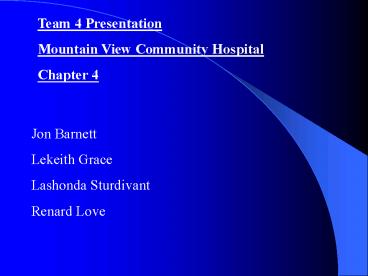Team 4 Presentation PowerPoint PPT Presentation
1 / 24
Title: Team 4 Presentation
1
Team 4 Presentation Mountain View Community
Hospital Chapter 4
Jon Barnett Lekeith Grace Lashonda
Sturdivant Renard Love
2
Project Question 1
- Is the ability to model supertype/subtype
relationships likely to be important in a
hospital environment such as Mountain View
Community Hospital?
3
Yes, a modern hospital is a triumph of
specialization. The hospital will find many
instances where a supertype needs to be divided
into subtypes.
For example
- ITEM Possible subtypes are Supply, Item, and
Prescription Item - PATIENT Possible subtypes are Inpatient and
Outpatient - TEST Possible subtypes are Scan and Blood Test
- PROCEDURE Possible subtypes are Biopsy and
Surgical
4
Project Question 2
- Can the business rules paradigm and the ability
to easily define, implement, and maintain
business rules be used as a competitive advantage
in a hospital environment such as MVCH? Why or
why not?
5
Answer
- Yes, the business rules paradigm can be used for
competitive advantage. Business rules allow a
business to change its processes and procedures
quickly in responding to environmental changes.
6
Project Question 3
- Do there appear to be any weak entities in the
description of the data requirements in this
project segment? If so, what are they?
7
Project Answer 3
- Yes, the entity VISIT (scheduled for outpatients)
is clearly a weak entity.
8
Project Question 4
- Can you think of any business rules (other than
the one explicitly described in the case) that
are likely to be used in a hospital environment?
9
Project Answer 4
- A hospital has many business rules. Two examples
are the following - a. A patient cannot be admitted to the hospital
without a referral from a responsible physician. - b. A nurse can be registered to a different care
center only by permission of the nurse in charge
of the care center where the nurse is presently
assigned.
10
Project Exercise 1
- Draw an EER diagram to accurately represent this
set of requirements, carefully following the
notation from this chapter.
11
Project Exercise 1 Answer
12
Project Exercise 2
- Develop definitions for each of the following
types of objects in your EER diagram from Project
Exercise 1. - A. entity types
- B. attributes
- C. relationships
13
Project Exercise Answer 2
- A. entity types
- Physician- a person who is licensed to practice
medicine in this state. - Patient- a person who has been admitted to
Mountain View Community Hospital or who is
currently being treated as an outpatient by the
hospital. - Employee-a person who has an employment agreement
with the hospital and who is on the hospital
payroll. - Care center- an organizational unit that performs
a related set of services directed toward patient
care. - B. attributes
- Person_ID- a persons social security number
- Birth_Date-month, day, and year a person was born
- Specialty- a physicians area of practice
- Location- the floor number and hospital wing for
a care center or laboratory. - C. Relationships
- Assigned-associates a resident patient with a
hospital bed. - scheduled-associates an outpatient with an
instance of a visit to the hospital.
14
Project Exercise 3
- You should recognize the statement a nurse
cannot be appointed nurse_in_charge of a care
canter unless she or he has an RN certificate as
a statement of a business rule. - What is the anchor object? Is it an entity, an
attribute, a relationship, or some other object? - What is the corresponding object (or objects, if
more than one)? Is it an entity, an attribute, a
relationship, or some other object?
15
Project Exercise Answer 3For a nurse to be
appointed nurse in charge of a care center, that
nurse must possess an RN certificate.
- A. Anchor object nurse(entity)
- B. Corresponding object RN Certificate (entity)
16
Project Exercises 4
Compare the EER diagram that you developed in
this chapter with the E-R diagram you developed
in Chapter 3 in Project Exercises 2. What are
the differences between these two diagrams? Why
are there differences?
17
(No Transcript)
18
Project Exercise 5
Merge the two diagrams from Project Exercise 4
and from Project Exercise 2 in Chapter 3 into a
single diagram. Explain decisions you make
during the merging. (These are the two diagrams
compared earlier.)
19
(No Transcript)
20
Some issues during the merging
Should there be a relationship among laboratory,
patient and physician for tests? (There is not
in our diagram.)
Are items consumed by both resident patients as
well as outpatients? Yes, there is a
relationship between ITEM and PATIENT that
implies that it applies to any subtypes of
PATIENT.
We kept the responsible relationship between
PATIENT and PHYSICIAN in place of the refers
relationship used in the ER model.
21
Jons quesiton
According to the EER Diagram from Project
Exercise 5, can there be any other instances of
EMPLOYEE besides those that fall under the
subtypes (TECHNICIAN, STAFF, and NURSE)? Can an
EMPLOYEE instance be in one or more of the
subtypes?
22
Renard's Question
- What four groups of persons are Mountain View
Community Hospital most dependant on for their
continued success, and indicate what are the
supertype or subtype.
23
Lashondas Question
- Why is VISIT a weak entity?
24
Lekeiths Question
What business rules apply to a PHYSICIAN?

